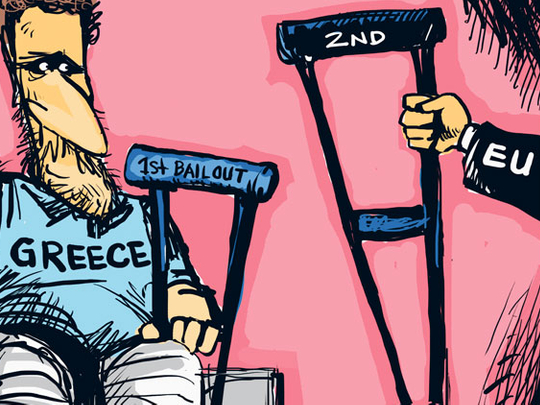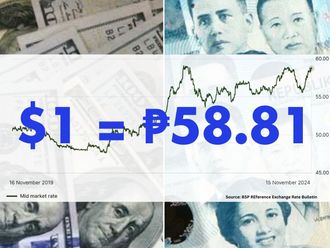
Bailout II, which European leaders arranged for Greece last week, is unlikely to bring the problems of that country or the euro area to an end.
Some commentators have estimated that the package of an additional €109 billion (Dh580 billion) of assistance, from all sources, will reduce Greece's ratio of debt-to-gross domestic product by about 12 per cent. As Greek debt had been projected to peak at 166 per cent next year, no likely level of official support is really going to resolve the crisis.
As of now, Bailout II contains everything: debt rollover, bond buybacks, debt swaps with lengthening maturities, and reduced funding costs. Where can we go from here? There are three ways out of an unsustainable level of debt: a country can grow out of it, inflate out of it — or default.
Growth seems like a pipe dream under present circumstances; the austerity measures extracted by the country's creditors have left the real economy in a coma. Greece has limited control over its inflation rate. Thus, we have default, and a restructuring of the debt far into the future. These options ignore the "Newfoundland solution", whereby Newfoundland surrendered its sovereignty and became a province of Canada in the 1940s, as a way out of its debt dilemma.
In times of crisis, commentators like to conjure up a doomsday scenario and the demise of the Eurozone and its single currency. Yet, the sovereign debt problem and the abandonment of the euro aren't linked in any way.
Lunatic fringe
A lunatic fringe notwithstanding, no one has any incentive to promote, or anything to gain from, the breakup of the euro. On the one hand, the currency of a nation, or bloc, is a socio-political decision, much like the country's flag or language. It is difficult to imagine any European politician taking a quasi-suicidal decision to leave the zone and seek to introduce a new national currency under present circumstances.
The benefits of unity — the elimination of exchange-rate uncertainty with major trading partners, the international liquidity of domestic money — are too great, and the risks of going it alone too horrendous. It would hardly solve the debt problem. Nor are markets in any position to dictate terms on what monetary numeraire a country must use. Such a view simply confuses the Eurozone with Bretton Woods. The comparison doesn't hold water. The euro, as a mainstay of foreign-exchange markets, is a sign of success rather than failure.
Mere prestige
One should bear in mind that the euro is no mere prestige creation of the European Union, but an essential element of an efficiently functioning common market. The creation of the euro was a remarkable achievement on the road to European integration. But, as European Central Bank President Jean-Claude Trichet has suggested, it does harbour certain risks, which require tighter fiscal discipline and coordination.
The contortions of the Eurozone's political leaders may not be a pretty sight, but this hand-wringing anguish is a well- worn ritual in arriving at tough decisions. If it were merely a case of Greece defaulting and being barred from capital markets, that would hardly be a problem. It would certainly impose budgetary discipline on Greece, and others, in the future. The real fear is of a chain reaction of default, whose limit we can only guess at and whose fallout might engulf us all.
The only real alternative is a measure of debt forgiveness, where the balance has a fair chance of being repaid, while keeping up pressure for fiscal reform.
The entire EU, and not just the Eurozone, must accept responsibility for Greek debt, refinancing it on world capital markets at the most favourable rates possible — in the manner of the International Bank for Reconstruction and Development — and reducing the Greek portion to what is manageable.
As the current debt of €340 billion is unmanageable, it is no more than a charade to implement rescue packages, which make the burden even greater.
Risk premium
Increasing the risk premium is also counterproductive. The reluctance with which troubled countries have been willing to accept assistance from the EU and the International Monetary Fund (IMF) suggests the risk of moral hazard has been overplayed.
It is no more than a superficial pretense at market discipline. Under present circumstances, it exacerbates the basic problem.
In Christian scriptures, debt forgiveness is recommended after a period of 50 years. The logic is that a debt that can't be repaid in half a century is as much the fault of the creditor as of the debtor. In this spirit, the Eurozone should bow to the inevitable and prepare for an orderly default on the part of Greece.
In the process, it could centralise the financing of national budgetary deficits in the future through the issue of a euro bond and other euro securities. Any national government borrowing over and above sanctioned levels would no longer have sovereign status, or have any backing of the Eurozone, implicit or otherwise.
This would be in keeping with the spirit of Maastricht.
Hannes Androsch was Austria's finance minister from 1970 to 1981. He is founder of AIC Androsch International Management Consulting in Vienna. The opinions expressed are his own.












